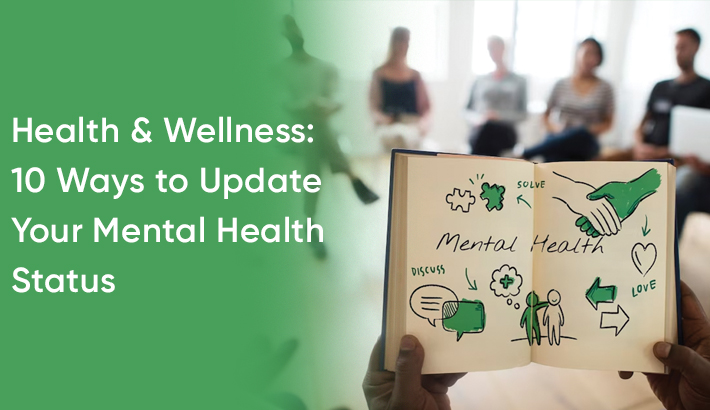Introduction
It is crucial to prioritize our mental health in today's fast-paced society to ensure our overall well-being. Our mental health affects how we think, feel, and act, influencing every aspect of our lives. With the increasing awareness of mental health's importance, many individuals are seeking ways to update and improve their mental health status. In this article, we will explore 10 effective ways to update your mental health status.
1. Practice Mindfulness Meditation
Focusing on the present moment without judgment, mindfulness meditation proves to be a potent technique. By regularly practicing mindfulness, you can reduce stress, anxiety, and negative thought patterns. Allocate a few minutes each day to sit quietly, breathe deeply, and be fully present in the moment.
2. Engage in Regular Physical Exercise
Physical exercise not only benefits our physical health but also has a positive impact on mental well-being. Regular exercise releases endorphins, the "feel-good" hormones, reducing feelings of sadness and boosting overall mood. Find an activity you enjoy, such as jogging, yoga, or dancing, and incorporate it into your daily routine.
3. Prioritize Quality Sleep
Sleep plays a crucial role in mental health restoration. Strive to obtain a range of 7-9 hours of restful sleep on a nightly basis. Develop a consistent sleep schedule, create a relaxing bedtime routine, and ensure your sleep environment is conducive to rest.
4. Cultivate Healthy Relationships
Human connections are vital for mental well-being. Surround yourself with people who are supportive and positive, always uplifting you. Nurture meaningful relationships and communicate openly with friends and family.
5. Limit Social Media Usage
While social media can keep us connected, excessive use may negatively impact mental health. Establish boundaries and designate specific time slots for using social media. Limit exposure to negative content and focus on positive and uplifting interactions.
6. Embrace a Balanced Diet
Nutrition plays a crucial role in mental health. Make sure to eat a diet that includes a variety of fruits, vegetables, whole grains, and lean proteins to maintain a balanced nutritional intake. Avoid excessive sugar, processed foods, and alcohol, as they can contribute to mood fluctuations.
7. Engage in Creative Activities
Unlock your creativity by engaging in activities such as painting, writing, or playing a musical instrument. Creative expression can serve as a therapeutic outlet, helping to reduce stress and improve overall mental well-being.
8. Practice Gratitude
Make it a habit to set aside some time every day to recognize and value the positive aspects of your life. Gratitude practice can shift your focus from negativity to positivity, promoting a healthier mental state.
9. Seek Professional Support
If you're facing persistent mental health challenges, don't hesitate to seek help from a mental health professional. Therapy or counseling can provide valuable tools and strategies to cope with difficulties.
10. Step into Nature
Spending time in nature can have a calming and rejuvenating effect on the mind. Take walks in the park, go hiking, or simply sit outside to enjoy the beauty of nature and reduce stress.
Conclusion
Updating your mental health status is a journey that requires commitment and self-compassion. By incorporating these ten ways into your daily life, you can make significant strides in improving your mental well-being. Make sure to have patience with yourself and take the time to celebrate all of the small milestones achieved along the journey.
FAQs
Q1. How often should I practice mindfulness meditation?
A. Aim for at least 5-10 minutes of mindfulness meditation daily for optimal results.
Q2. Can regular exercise replace therapy for mental health issues?
A. While exercise is beneficial, therapy offers specific tools and support tailored to individual needs. It's best to combine both for comprehensive care.
Q3. What foods should I avoid to maintain good mental health?
A. Minimize the consumption of processed foods, sugary snacks, and excessive caffeine or alcohol.
Q4. Is seeking professional help a sign of weakness?
A. No, seeking professional support shows strength and a proactive approach to improving mental health.
Q5. Can spending time in nature really make a difference?
A. Yes, being in nature can reduce stress, increase happiness, and promote a sense of well-being.






Leave a reply